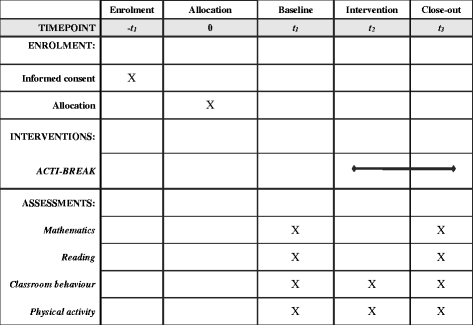A primary school active break programme (ACTI-BREAK): study protocol for a pilot cluster randomised controlled trial
- PMID: 28927442
- PMCID: PMC5606066
- DOI: 10.1186/s13063-017-2163-5
A primary school active break programme (ACTI-BREAK): study protocol for a pilot cluster randomised controlled trial
Abstract
Background: Levels of overall physical activity have been shown to decline across childhood. Schools are considered ideal settings to promote physical activity as children spend a large amount of their waking hours at school. Time-efficient physical activity strategies that demonstrate a positive impact on academic-related outcomes are needed to enable physical activity to be prioritised in the school day. The ACTI-BREAK programme requires classroom teachers to integrate active breaks; 5-min bursts of moderate-intensity physical activity into their classroom routine. Active breaks have been shown to be effective in improving academic-related outcomes, a potentially appealing aspect for teachers and schools. The primary aim of this study is to assess the feasibility and potential efficacy of the ACTI-BREAK programme on children's academic achievement. Secondary aims are to explore the impact of ACTI-BREAK on children's on-task behaviour and objectively measured physical activity levels.
Methods: ACTI-BREAK is a 6-week, classroom-based, physical activity intervention. This pilot trial of the programme will be evaluated using a cluster randomised controlled design. Government primary schools in metropolitan Melbourne, Australia will be invited to participate in the programme in 2017. Randomisation will occur at the school level, with the aim to recruit six schools (three intervention and three control). The ACTI-BREAK programme is theoretically grounded, and was developed with input and guidance from current primary school teachers. Teachers from the intervention schools will receive a 45-min training session and be asked to incorporate ACTI-BREAKS into their classroom routine three times per day for 6 weeks. Intervention support will be provided via assisted delivery. The primary outcomes will be children's academic achievement in mathematics and reading. Children's on-task behaviour and school-day physical activity will be assessed as secondary outcomes. Process evaluation will also be carried out.
Discussion: The ACTI-BREAK programme has been designed to be a time-efficient, feasible and appealing approach to physical activity promotion for schools. This study will assess required teacher time commitment and the potential for the ACTI-BREAK programme to improve academic-related outcomes and school-day physical activity levels with the potential for a full-scale trial in the future.
Trial registration: Australia New Zealand Clinical Trials Registry, identifier ACTRN12617000602325 . Retrospectively registered on 27 April 2017.
Keywords: Academic outcomes; Children; Classroom; Intervention; Physical activity; Protocol; School.
Conflict of interest statement
Authors’ information
AW is an experienced primary school teacher, and holds a Master of Public Health from the University of Adelaide.
Ethics approval and consent to participate
Ethical approval has been attained from Deakin University Human Research Ethics Committee, Melbourne, Australia (2016-020) and the Victorian Department of Education and Training (2016-002962). Principals, teachers, and parents will provide written informed consent.
Consent for publication
Not applicable.
Competing interests
The authors declare they have no competing interests
Publisher’s Note
Springer Nature remains neutral with regard to jurisdictional claims in published maps and institutional affiliations.
Figures
References
-
- Okely T, Salmon J, Vella S, Cliff D, Timperio A, Tremblay M, Trost S, Shilton T, Hinkley T, Ridgers N, Phillipson L, Hesketh K, Parrish A, Janssen X, Brown M, Emmel J, Marino N. Report prepared for the Australian Government Department of Health. Canberra: Commonwealth of Australia; 2012. A systematic review to update the Australian physical activity guidelines for children and young people.
-
- Sibley BA, Etnier JL. The relationship between physical activity and cognition in children: a meta-analysis. Pediatr Exerc Sci. 2003;15:243–56. doi: 10.1123/pes.15.3.243. - DOI
-
- Erwin H, Fedewa A, Beighle A, Ahn S. A quantitative review of physical activity, health, and learning outcomes associated with classroom-based physical activity interventions. J Appl Sch Psychol. 2012;28(1):14–36. doi: 10.1080/15377903.2012.643755. - DOI
-
- Active Healthy Kids Canada. Active Healthy Kids Canada. Are we driving our kids to unhealthy habits? The 2013 Active Healthy Kids Canada Report Card on Physical Activity for Children and Youth. 2013. [26 March 2015]; Available from: http://www.activehealthykids.ca/2013ReportCard/en/. Accessed 18 Aug 2017.
Publication types
MeSH terms
Associated data
LinkOut - more resources
Full Text Sources
Other Literature Sources
Medical
Miscellaneous



